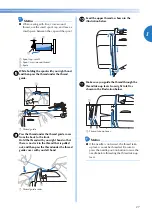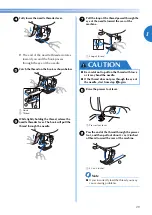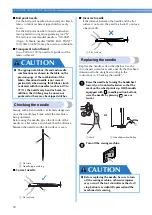
21
1
————————————————————————————————————————————————————————————————————————————————————————————————————————————————————————
e
Pull the thread to the right and pass it through
the slit in the bobbin winder seat.
a
Slit in bobbin winder seat (with built-in cutter)
X
The thread is cut to a suitable length.
f
Slide the sewing speed controller to the right
(to set the speed to fast) (for models equipped
with the sewing speed controller).
a
Sewing speed controller
g
Turn on the sewing machine.
h
Press the foot controller or press
(start/
stop button) (for models equipped with the
start/stop button) to start.
Note
●
If the sewing machine is to be operated
using the foot controller, connect the foot
controller before turning on the machine.
●
When the foot controller is plugged in, the
start/stop button cannot be used to start
sewing (only for models equipped with the
start/stop button).
i
When the bobbin begins spinning slowly, take
your foot off the foot controller or press
(start/stop button) (for models equipped with
the start/stop button).
j
Cut the thread, slide the bobbin winder shaft
to the left, and then remove the bobbin from
the shaft.
k
Slide the sewing speed controller back to its
original position (for models equipped with
the sewing speed controller).
Memo
●
When the sewing machine is started or the
handwheel is turned after winding the
thread around the bobbin, the machine will
make a clicking sound; this is not a
malfunction.
●
The needle bar does not move when you
slide the bobbin winding shaft to the right.
●
Be sure to cut the thread as described. If the
bobbin is wound without cutting the thread
using the cutter built into the slit in the
bobbin winder seat, the thread may become
tangled in the bobbin or the needle may bend
or break when the bobbin thread starts to run
out.
CAUTION
●
Not winding the bobbin properly may cause the
thread tension to loosen, and may break the needle.
a
Wound evenly
b
Wound poorly
CAUTION
1
2
















































